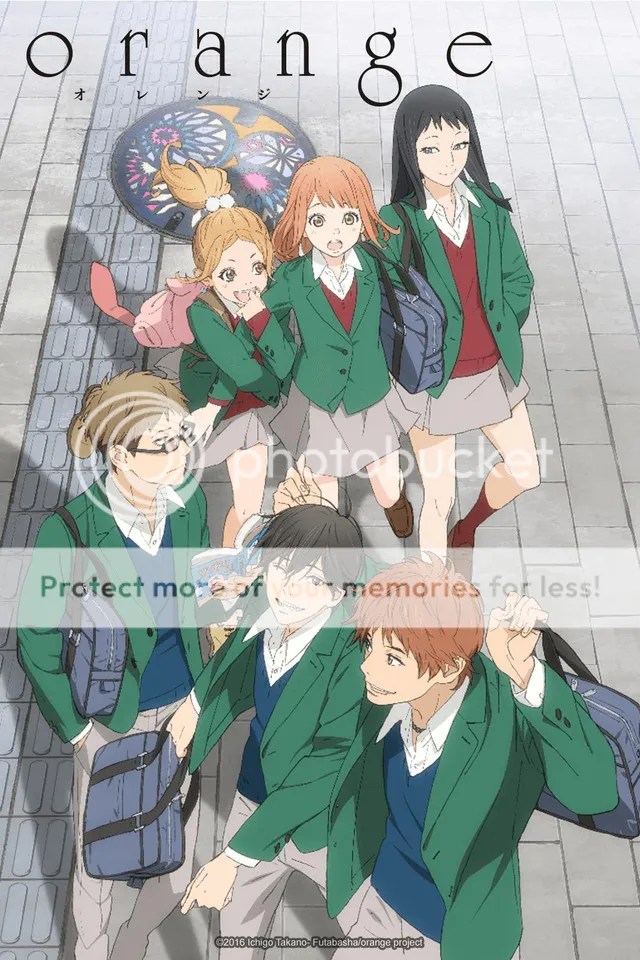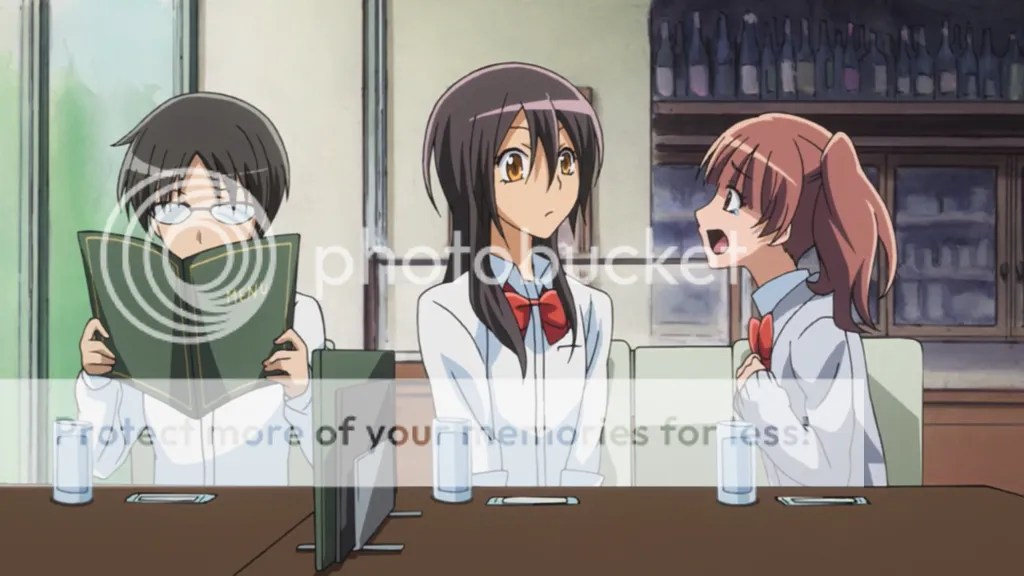
| Studio | Telecom Animation Film |
|---|---|
| Genres | Drama, Romance |
| Source | Manga |
| Episodes | 13 |
| Season | Summer 2016 |
| Director | Hiroshi Hamasaki |
| Music | Hiroaki Tsutsumi |
There are anime that by the majority of the viewers are believed to be outstanding in each and every aspect (Cowboy Bebop probably won’t receive much objections) or conversely just don’t have any redeeming qualities (Mars of Destruction, even less objections). Yet, only a handful of shows tend to be well-balanced in all of their departments – for example having a good soundtrack sadly doesn’t automatically grant a good story. For instance my experience with Makoto Shinkai’s films (yet to see Kimi no Na wa.) has been rather ambiguous – the visuals are breathtakingly amazing but the stories often seem quite lacking. In this context Orange looks like a particularly diverse show – the story alone sometimes makes you laugh (sadly, unintentionally) and other times it surprises with wisdom. Other aspects also can be very polarizing in terms of execution. Let’s dig a little deeper and find out about the goods and the bads of this anime.

Orange starts with a very fantasy-like event – a high-schooler (how else?) Naho gets a letter from her future self, telling about various regrets she came to have. The letter pleads Naho to experience a bit different life – to alter some of decisions that her future self made. Thus Naho would avoid frustration that many times is centered on her relationship with a new transfer student (again, how else?) Kakeru. As you see, the suspension of disbelief must be employed right from the start but hope that everything will be explained later on gives the story a little head start. Yet, in this very place the problems started. As I wrote in my remarks about Boku dake ga Inai Machi, an explanation to some supernatural phenomenon usually is wanted by the viewers but no explanation generally is a lot better than a bad one. And writing stories that involve time travel you have to put a damn much effort to think of at least a bit plausible and believable mechanism. Of course, Orange isn’t a story centered on time travel and it’s just a plot device to get things moving, but the writer looks to have wanted to include an explanation at all costs, and it did cost quite expensively. All the build-up of emotions and the tranquility of the relationships between people get thrown out of the window when Orange tries to invoke all the means that sci-fi can offer – Bermuda Triangle, parallel Universes and stuff – to justify the premise and just wastes time making an effort out of a situation with no possible favorable outcome.

Another quite huge plot convenience was Naho’s way of reading her letter. It seems that she didn’t even thought of reading the letter whole to the very end once she got it. Yes, Naho herself was troubled for some time thinking that knowing what will happen in the future isn’t right and it only steals the joy of making various decisions but in many instances some drama and uncertainty could have been easily eliminated if only she had had some brains to read everything. Also, it seems like the letter was deliberately made ambiguous with some information withheld and only to be thrown in at the last second. I doubt if anyone truly wanting to give exact instructions how to do something would be so imprecise and wouldn’t think at all about the problems that might arise (and do arise) for the person reading the letter and trying to behave according to the instructions. By the way, why Orange? Why not, say, Banana or Rhubarb? It looks like the author just thought about a cool sounding title and only then was reminded that a title should have some connection with the creation itself. Sure, there is one scene where Kakeru buys Naho some orange juice as she asked when Kakeru was buying things for the whole group, but it’s a one-time-only motive that has no lasting influence.

You can think what you want about the achievements and shortcomings of the story, but the characters do deserve appreciation. To think about it, barely anyone of the main cast is strong enough to carry the show or to be interesting by himself/herself, but it’s actually the whole ensemble of them that provides the best moments. Naho as a lead character is rather dull and could probably be best described as just a normal sweet and hard-working girl. Apart from her failure to read the letter whole from the very start, some pondering about the possibilities and outcomes of changing the future and general concern for her friends, she doesn’t appear to be exceptional in any way from a typical supporting character. Suwa, a sports guy with enough optimistic attitude to be someone to lean upon if necessary, Azu, your pretty much typical genki girl with a knack for making jokes of another guy in the group – not that sporty Hagita – who doesn’t really mind and looks to be enjoying that, and Takako, who usually remains in the background and doesn’t do anything special apart from just being there – that’s the group of Naho’s friends who together make one of the most well-made friend units that I can remember in anime. There are many scenes where nothing special is happening and all the group just talks about nonsense, small things, or just teases one another. You get the feeling that they are really comfortable together and if need be, would do anything to offer any possible help. Then there is also Kakeru, a darker person (well, not only by his appearance), who is instantly picked up by the group and only by his own worries and insecurities doesn’t immediately become one of them as if he had known everyone for all his life. Kakeru has problems, and the show treats them very carefully and respectfully, pointing that in the real world such things are no joke and you may need all your abilities and more to help a person as troubled as Kakeru is.

Excerpt from the OP
The animation is probably the weakest part of the show. The studio Telecom Animation Film previously hasn’t done much worth noticing and worries of many people proved to be justified as the season went by. If the OP of a show gets the best sakuga moments of the show it’s no big deal but when you notice that during the later episodes the OP becomes the only place to look for anything decently animated, there’s a problem. Using slow pans, lots of close-ups and barely anything moving eventually become a standard to be expected of the show and it’s a shame because the story really deserved better. Painfully CG-ish students, sometimes strolling across the backgrounds don’t offer much help, either, as well as characters shamefully appearing off model way more than I’d find acceptable for no apparent reason save lack of time and money. Looking on a brighter side, the visual concept of the show appears to be not that standard. I don’t know how common green jackets are in Japanese high-schools but these, paired with very whitish and washed-out environment, create a noticeable contrast and a memorable atmosphere. The pale surroundings remind me of another show that had quite a similar visual concept – Stein’s;Gate. Oh wait, it turns out that rather coincidently both of the shows share the same director – Hiroshi Hamasaki. I won’t say that otherwise Orange would have been a terrible show, but the presence of this man certainly did a huge favor for the visuals even with the very limited means that were available.

Speaking about the soundtrack, I must return to the OP. As Orange was the show I started my summer season with, I was thirsty for something exciting and this OP just blew away all my expectations with immeasurable energy and sense of joy with some fleeting moments of sadness. For me Yu Takahashi’s song paired with the storyboarding and directing by the director himself somehow made this OP one of the most memorable of the whole year. The rest of the soundtrack, composed by Hiroaki Tsutsumi, doesn’t contain anything as striking, but as a background music it works really well. I don’t think I’d ever listen to this soundtrack as a piece of art, but sometimes when you just want to create some peaceful slice-of-life-ish atmosphere, many of the tracks work perfectly. As usually in such a show a piano and strings make up the largest part of the sound, also usually supported by guitars and an occasional violin solo. Looking to the soundtrack as a part of the anime, I can confirm that it blends well with the general atmosphere, usually remaining cheerful and managing to offer some seriousness during more emotional scenes.
The OP: 'Hikari no Hahen' by Yu Takahashi
Orange is a really mixed bag – when it’s good, it’s truly emotional and beautiful, and when it’s bad you just want to drop it and never think about it again. Yet, the show certainly has character. I think the friendship was portrayed very well – the group of friends has a great chemistry, feels very genuine, lively and real, as if you could easily belong to it yourself. The quality of the visuals didn’t do justice for the story and even the story has many things to be criticized for, but it might not always be the case – there are opinions that all the parallel universe stuff could be thought of as a daydream of Naho, and in this way many unsatisfying things would nicely fall into places, but it’s your own choice to think what you will. Of course since there probably are more plot holes in Orange than in a typical colander there still would be things to be disappointed about but at least for me the positives of the show had more weight to keep me watching.
Excerpt from the OST: 'Yell' by Hiroaki Tsutsumi
I believe, this anime is
 Decent
Decent
Despite all the shortcomings I still think Orange is worth giving a try. Maybe not anime but the original manga, but if you are able not to be bothered too much by all the dissonance of the sci-fi element (among other things) with the whole mood of the show you could certainly get an enjoyable experience, enriched by moments that call for more thought about living your life in such a way that your future self won’t have to judge your present self too harshly.












